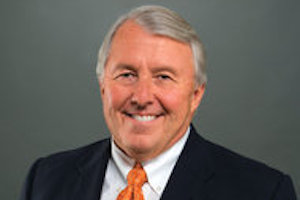Pepperdine President Andrew K. Benton Elected to National Leadership Role
Pepperdine University President Andrew K. Benton has been elected to a three-year
term on the board of the National Association of Independent Colleges and Universities
(NAICU).
In his board member role, Benton will represent Region VIII, which includes Alaska, Arizona, California, Colorado, Hawaii, Idaho, Montana, New Mexico, Nevada, Oregon, Utah, Washington, and Wyoming. He was elected to the representative position by member college and university presidents from those states.
“I am honored to serve on the NAICU board along with my esteemed colleagues,” Benton said. “This is an especially challenging time in American higher education and I look forward to the engagement.”
Benton also serves on the NAICU’s Policy Analysis and Public Relations Committee, which identifies current and future issues affecting independent higher education and suggests priorities and strategies for research and public relations activities to enhance public understanding of and support for independent higher education.
“Andy Benton brings to the NAICU board of directors a record of remarkable leadership at Pepperdine and a keen understanding of the relationship between higher education and public policy,” said NAICU president David L. Warren.
Pepperdine University has been a member university of the NAICU for many years. Benton was a member of the NAICU board from February 2011 to February 2013 and served on the Committee on Accountability, including holding the post of chair from February 2012 to February 2013.
NAICU is the national public policy association for the nation’s private, nonprofit colleges and universities. The organization’s 963 member institutions include major research universities, church-related colleges, historically black colleges, art and design colleges, traditional liberal arts and science institutions, women’s colleges, two-year colleges, and schools of law, medicine, engineering, business, and other professions. NAICU reflects the diversity of independent higher education in the United States.
“Private higher education today faces an unprecedented combination of challenges including the deepening role of the federal government, tightening fiscal constraints, rapidly changing student demographics, technological innovation, and globalization,” Warren said. “The experience and leadership of board members will be critical in the years ahead as NAICU and our members navigate this time of change and challenge for American higher education.”